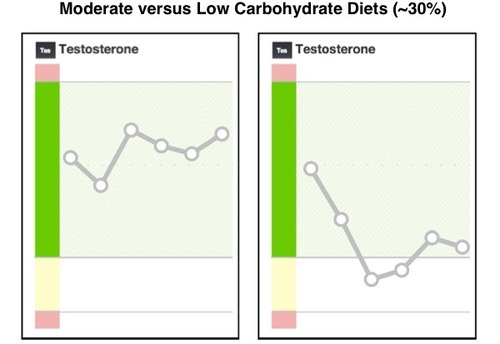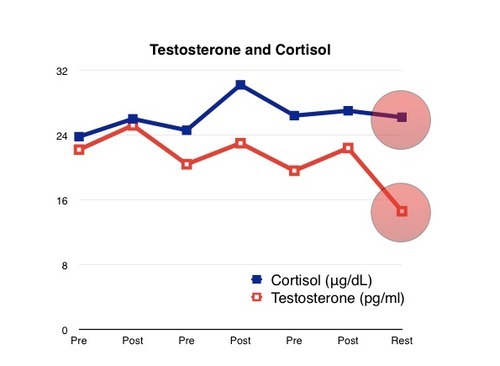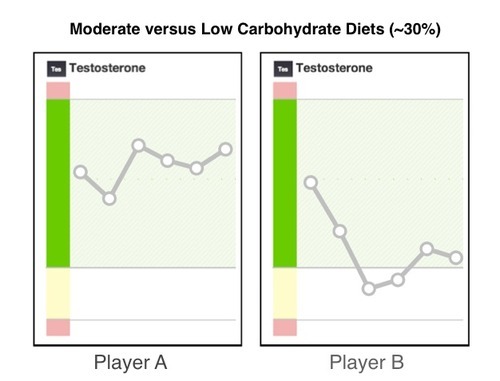A recent article about the Los Angeles Lakers nutrition program has created a firestorm, with different opinions weighing in on the dietary practices of NBA players. Any time blood analysis is brought up, we tend to get many coaches and nutritionists requesting more information about our blood analysis services and our thoughts on the articles in question. As the Chief Science Officer of InsideTracker, I felt compelled to speak my mind on the matter of athletic diets and biomarkers for sports performance. We have a massive database of athletes and have tracked professional athletes for years using our service. Several athletes, including NBA players, have come to us to get the full window inside their bodies in order to perform at their best.
Because we service different sports, we have the responsibility of looking at a wide range of athletes with unique demographics, training plans, and of course diets. Nutritional habits are difficult to change and improve, but this is precisely why sharing blood test results with the athlete can help with compliance. In the recent article, Dwight Howard’s high sugar intake, the nutritionist’s fear of diabetes, and his election to lower his intake were discussed. His intake of candy and sugary drinks was out of control, but he looked like his nickname, Superman, fooling everyone into thinking his nutrition must be fine. Many athletes look amazing on the outside and perform miracles on the court and on the field, but internally their bodies are very much mortal and some are dangerously unhealthy. We love the fact that blood analysis led to behavior modification and eating healthier foods. The questions we are getting now include whether all athletes should be following 25% carbohydrate intake diets, and what happens over a season with different diets such as Paleo and low carbohydrate options. Nutrition is the hardest area to monitor, but we have experience looking at the complete picture — and agents, private coaches, and teams are seeing the results when blood analysis is part of the program.
It was great that Los Angeles decided to do blood analysis, and the biomarker glucose was mentioned. Anticipating that teams and athletes would ask similar questions about biomarkers, I wanted to explain the importance of testosterone and share how carbohydrate factors in.
Testosterone is a hormone that is widely known, for good reason. It’s one of the most important biomarkers to athletes and we track both total testosterone and free testosterone with our Ultimate Panel, soon to be released to the public. For the most part, total testosterone is a very effective way to screen athletes, but when doing advanced analysis we use free testosterone as well as data from training, to explore what could be going wrong, or hopefully what is working. Athletes are known to illegally augment their testosterone levels with anabolic steroids, and to combat that we have focused on providing alternatives to reduce overtraining and fatigue. Low carbohydrate intakes are known to be associated with reducing testosterone when an athlete is training hard, and several studies point out that glycogen may play a part in this. High glycogen stores don’t guarantee prevention of fatigue or overtraining, but we see chronic low testosterone in athletes who are simply not getting enough of the right micronutrients, especially carbohydrates.
Sport scientists have used the ratio between the anabolic hormone testosterone and the catabolic hormone cortisol to get a rough estimate of what the body is trying to do internally. The testosterone and cortisol ratio is not perfect, but it’s a valid way to get the physiological status of team sport athletes. Cortisol is essential to performance because it helps break down substrate, but sometimes it gets at bad rap in the news. It is true that chronically elevated cortisol can be a disaster to athletes if not addressed, but most of the times we at InsideTracker see the pattern of too much activity and too little carbohydrate. For an example of how low carbohydrate can derail an athlete, the European Journal of Applied Physiology investigated how testosterone falls just after three days of intense activity when carbohydrate is roughly 30% of the diet. A study performed by colleagues at the University of Carolina used the free testosterone and cortisol to track what happens when one repeatedly follows a feeding strategy of low carbohydrate on one’s anabolic hormones. Just after a few days we can clearly see how cortisol stayed elevated, and testosterone dropped below baseline. Athletes want just the opposite, where testosterone remains at normal levels or improves, and cortisol drops down to normal levels.
The next question is if low carbohydrate interferes with the body, what happens over a season? Some will argue that the athletes will adapt to the changes and testosterone will come back to baseline and cortisol will lower to athlete norms. Others may believe that the problem will continue to spiral down and ruin the athlete’s season with a performance drop that they can’t pull out of. The only way to know is to re-test a few times to monitor change. Research on the NBA is very limited with sport science, but European leagues have hinted that a long season is likely to break down a player. Although athletes often will rise to the occasion, especially in the playoffs, the demands of the sport will catch up with the player and an increase in injury and decrease of performance will be seen.
Our approach with athletes is to look at blood biomarkers, body composition, and simple testing of performance to tell if a nutrition program is working. Athletes do get leaner when guided by the right nutrition. But, we want to see actual increases of power and conditioning, so we watch how testosterone and other biomarkers like CK, CRP, and hemoglobin fluctuate over the season with training. Coaches like to see improvements in strength and power as well as in performance on SPORTVU and GPS reporting, two tools used to track how far and fast basketball players are moving. In addition to strength and conditioning abilities, teams are providing physiological monitoring with the use of HRV (Heart Rate Variability) to observe recovery from playing and practicing. We provide advanced services to assist teams in understanding how nutrition and rest may be explained with sport science data they are collecting.
The profiles of two basketball athletes, who have agreed to share their data, are above. Each worked with a private coach to evaluate the nutrition programs that they were following. Player A didn’t follow any specific diet and focused on eating more fruits and vegetables, because his bad habits were temptations. His weakness was chips and unhealthy snacks like candy, specifically king-sized Butterfingers! Player B was eating everything organic, free-range meats, and he eliminated gluten entirely, even though he wasn’t gluten intolerant. His nutritionist was confused why testosterone was low since he was eating plenty of protein and his salads were catered. What was found was that since he tended to sleep in and miss meals, his diet was very low on carbohydrate, and the third test showed he was critically low on testosterone. What was working in the offseason wasn’t working after the preseason, and during the competitive season he was a mess. In the playoffs he improved but still was not the same. We admire his dedication to the diet to eat better, but he accidentally placed himself in a compromised position even after adding more fruits and sensible carbohydrate sources. The lesson learned is moderation isn’t going to sell books and excite people, but we confidently know that blood analysis reveals the truth of what is going inside the body.
In the last year, we are seeing more and more interest in catering meals based on blood testing and we commend the Lakers for using catering services to help apply nutritional ideas to real solutions. We have had teams and private coaches invest in providing meals designed to meet their athlete’s specific biochemistry needs, and we are seeing better results on the field. Also, athletes are relieved about not having to find restaurants on the road that may or may not provide specific meals to fit their requirements. Several elite athletes have personal chefs or share caterers, but we are excited to see athletes take an active role with what they are eating from our education services. We recently had an NBA player contact us and he used our lead nutritionist to make practical eating changes he knew were realistic and easy to apply. InsideTracker is about measured results, and our web programs and added-value services empower our users.
Over a year ago, ESPN projected that the NBA would be applying blood testing in ten years to get their athletes the right recovery and nutrition solutions. We have been providing that future for years and are excited that teams are starting to catch on. One caveat though, blood chemistry is not simply getting a blood test and seeing what biomarkers are out of their optimized zone, since thousands of research studies and years of experience are needed to make the careful decisions. We built an analytic system, BRAIN, to help our professional athletes that have special requirements beyond the consumer product. As we grow we will provide that tool to all of our customers, because wellness and health are important to everyone, not just elite athletes.
Try Our Free Demo